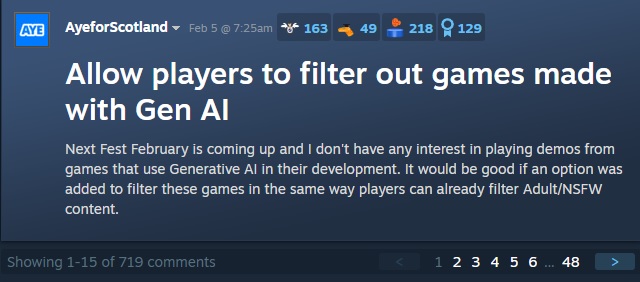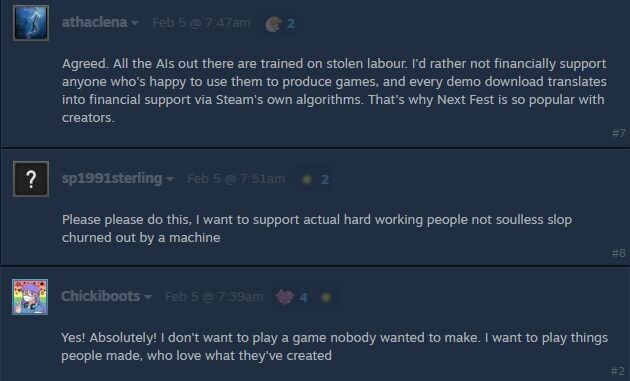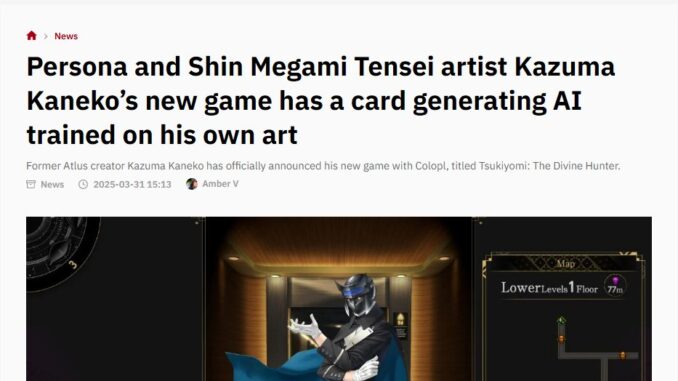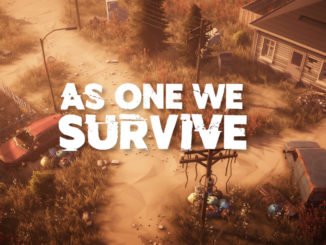
There is a discussion over on the Steam Forums which has gained some traction where players are demanding tools to filter out AI-generated content, a discussion that brings with it a huge sense of déjà vu. Such sentiment has been growing in all sectors of media where artists, writers, composers, etc feel threatened by the advancement of AI. So it is no surprise that the topic of AI in video games would come up. But here’s the harsh reality: AI is already entrenched in gaming. From the sprawling worlds of triple-A blockbusters to the quirky randomness of indie roguelikes AI is being utilized. While customers have a right to demand filters to weed out games not suited to their preference, these particular Steam users are going to be missing out on a tidal wave of innovation.
That is, if they can stick to their convictions.
Given the veracity and energetic responses, it sounds like these gamers are serious about their anti-AI stance. Yet, how many of them have already purchased games which have used generative AI? After all, AI is a very powerful tool with an inexhaustible amount of potential when it comes to game development (Elon Musk certainly thinks so).
Large video game developers and publishers have been using AI such as Activision’s Call of Duty: Black Ops 6 which was recently revealed to use generative AI. Given that Call of Duty is one of the best-selling franchises out there, it wouldn’t be surprising that many anti-AI gamers have already supported generative AI without knowing it. And it doesn’t stop there. According to Microsoft’s boss Satya Nadella the company is already training MUSE, its gaming AI, on a “catalogue of games” soon. Then there is Microsoft Flight Simulator which heavily relies on generative AI to create the game world which transforms 2D satellite imagery into a 3D representation of earth.
Then you have a company like Ubisoft which has developed its own in-house generative AI tool called Ghostwriter which was created to write NPC barks which are phrases and sounds uttered by NPCs when an event triggers. The Assassin’s Creed developer has taken this further by teaming up with NVIDIA and are creating a tool called NEO NPC which is supposed to make interactions with NPCs more real.
In fact, it would be surprising if Assassin’s Creed Shadows was utilizing generative AI, which would be the least of the game’s many issues (racism and intrusive DRM). But it becomes more likely since Assassin’s Creed Shadows has been delayed twice as the company is desperate to make it a success. Let’s face it, it would be more shocking if Ubisoft’s Assassin’s Creed Shadows didn’t use generative AI or any type of AI tool during its development process.

While many gamers will pour the hatorade on the larger companies, its disheartening to see that hate directed at indie developers too. After all, triple-A studios have massive budgets to pay their developers and creatives, but indie developers do not. So why hate them for utilizing a tool that decreases the development time of their game and without stretching their budget? Especially when it comes to roguelikes which feature a plethora of combinations for characters, weapons, items, and map layouts.
When it comes to indie games, it makes a lot of sense that these solo and small development teams would utilize AI to help them speed up the process. After all, many tend to be working their real jobs to pay the bills while developing their game on the side. A game that they are passionate about and want to see finished only to see gamers not even look at their game because they used AI to help develop some graphics, maybe some code, etc?
There is also China. You can bet your bottom yuan that Chinese developers are using AI. A major problem in a country where development costs are already lower than the West when it comes to the salaries of developers. But China’s video game industry is a discussion for another time.
Suffice to say, those who would use an AI filter, if Valve implements one on Steam, would be missing out on both triple-A games and indie games. Which is a big shame for the latter.
But how far are these detractors of generative AI, and AI in general, willing to go? Does that include other uses of AI that would take away from the efforts of creatives? After all, Photoshop uses an AI generative fill tool that helps artist’s speed up the process. There are word programs that use AI assistance for editing, predictive text, and more. Would such things, which takes away from artists and writers, also be a reason to not purchase a game?
Eventually, you are going to have voice artists, and even regular people, feeding their voices into an AI audio program, such as ElevenLabs, so that it can recreate their voice to be used by a company or anyone who likes it. Does that mean people should boycott anything that uses that person’s voice? How is that any different than a talented voice actor like Troy Baker mimicking Indiana Jones actor Harrison Ford (brilliantly, we must add)? What about artists training AI on their art style and using it to produce work based on their particular style?
Finally, does this adverse reaction to AI extend to AI translation tools? What about companies that are using AI to translate anime and manga? Especially knowing that woke translators, for years, tended to warp the translations of an anime, manga, and eastern-developed video game words to suit their agenda or ideology?
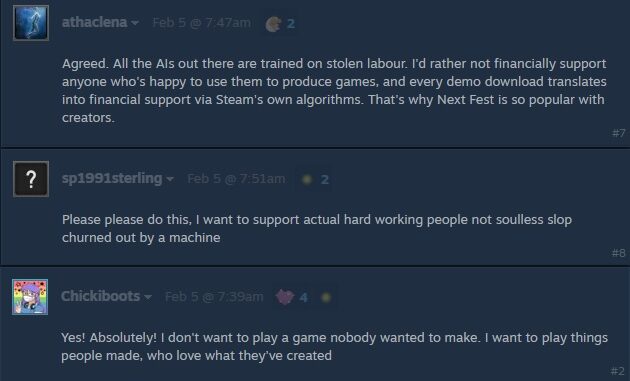
The PC gamers in the Steam Discussing decrying AI reminds us of a similar outcry 16 years ago over the news that Call of Duty: Modern Warfare 2 would drop dedicated server support. There was a huge uproar over it until the game was released. Then, the vast majority of the PC gamers who spoke out were suddenly playing the game. A sad, yet common trend in PC gaming which has been at the forefront of stripping away the right to own the games we buy, acceptance of draconian DRM, being fine with invasive DRM, and a multiplayer landscape that is worse than it was in the 1990s and early 2000s.
In other words, the loudest critics, those flooding Steam forums and X with anti-AI talking points, often miss the irony. These are the same folks who’ve let greedy publishers erode their rights for years which also includes microtransactions and always-online DRM. They’ve bought middling titles at inflated prices because of hype or nostalgia regardless if AI was used or not. That’s why Call of Duty: Black Ops 6 did so well opening day beside the fact that AI was used.
Sticking their heads in the sand over AI won’t save gaming or artists, it’ll just blind users to its evolution and the games which will come about as a result of its use. For triple-As to indie games, AI is a tool, not a Thief hiding in Deadly Shadows to deprive people of their jobs. AI can be used to quickly provide a framework, but artists, writers, and creatives are still needed to expand and flesh it all out. If gamers decide to filter it out, then you’re not just missing bad games, you’re going to be missing out on the future. Quality should be the battleground, not technology.
Because whether you like it or not, AI’s here—and it’s only getting better.
Author’s Note:
Support this site by donating via Paypal or even checking out our merchandise on RedBubble where you can find designs that cater to writers and readers. Money donated and raised goes into paying for this website and equipment.
Interested in posting this article, or another article, on your website? Check out our prices to make that happen – https://tinyurl.com/mrxa56pp
We just published our children’s book The Lemonade Stand Log Book for Child Entrepreneurs, so check it out and recommend it to any parents looking to get their kids interested in learning to make money and becoming fiscally responsible.

